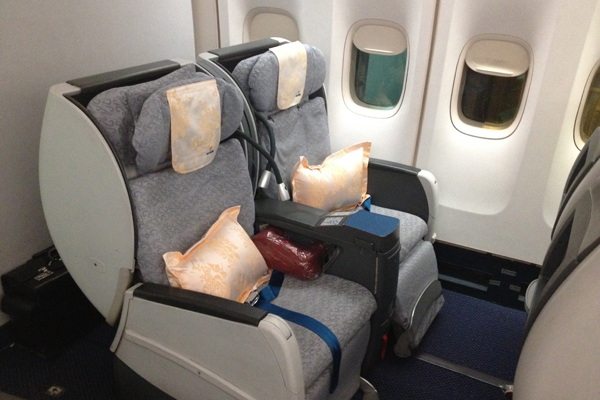Etanor,
Agreed. The upgrade is a small price to pay for what costs the airlines the most: space.

With a brief trip to Guangzhou earlier this week, I had a chance to examine one of China’s travel questions: is it worth it to fly first class?
Now, domestic first class anywhere is rarely like international first class. Many airlines or countries don’t even offer first class within their own borders, opting instead for business class, which in domestic terms means “bigger seat and sparkling wine.”
When buying a ticket to Guangzhou only two days before departure, as is often the case in China the first class ticket price was only RMB 200 or 300 more each way than economy, so I opted to bump myself up, flying on Air China.
I was keen to see what additional privileges were available to fare-paying first-class passengers. It’s one thing to be upgraded to business class due to loyalty or overcrowding, but an upgrade to first class is rare.
Check-in online was easy but no different than for economy class passengers. Of course, when I arrived at the airport, there was a special line for business and first check-in, with no one in front of me. I had originally planned a tight schedule to the airport and had I actually been running late, this would have been a relief. An even greater stress reliever would have been the separate security line, which had only three people in it.
With some time to spare, I visited Air China’s first class lounge at Beijing Capital International Airport Terminal 3. Now, BCIA is Air China’s home airport, and T3 its primary terminal. This lounge should be their best in the world. I was greeted by comfortable but worn pleather chairs, and a fine selection of crackers and canned non-alcoholic beverages stored in refrigerators but not chilled. In other words, the first class lounge is like your local xiaomaibu, only with better chairs. A large sign at the entrance of the lounge stated that flight announcements would not be made in order to maintain a more serene atmosphere. That may be true, but while the lounge staff did not make such announcements, the speaker for terminal announcements is right above the area, so no such serenity now.
At boarding, there was a separate line, and because the flight was departing from a bus gate, a separate bus. However, when first invited to board, the four of us present went outside to find the VIP bus had not arrived, so we stood in the cold for about 10 minutes. A Chinese-made minibus like this is very comfortable for a day trip to the Great Wall, but somewhat poorly suited for passengers with luggage. The bus was also unheated, not much of a privilege in Beijing in December.
Cabin staff were courteous and helpful upon boarding, helping to find places for luggage and coats. I was offered a drink but nothing with alcohol. I mention this not because of any desire to get tanked on board, but because many air passengers imagine first class as a hot tub filled with flowing Champagne in which the elite strap themselves in and then recline for the duration of the flight. At least Air China domestic, this was not the case.
I was flying on a Boeing 747, and perhaps for this reason, the seats were spacious and comfortable. There is space for everything: books, feet, hand luggage, pillows, and blankets. Noise-canceling earphones were provided for use.
Just before take-off, we were offered a menu with five choices of hot snacks. I chose the Beijing standard dumplings. Falling asleep during take-off, cabin crew waited until I woke up an hour later to serve the food. which also included a plate of fruit and a small piece of mocha cake. The dumplings were served with no sauce of any kind, no soy, vinegar, or hot sauce. The dumplings were edible but nothing I couldn’t improve upon at any jiaozi place on a Beijing street.
For entertainment, a 13-inch HD screen sat in front of me, There were multiple options for both Chinese and English language programming, games, and other information like the flight map. My seat had a button that indicated it would recline fully, but I was not able to achieve that position. Still, it was more than adequate to allow comfortable sleep, and that’s what I did for the rest of the flight.
Upon landing, we deplaned first and were again directed to a VIP minibus, which surprisingly was heated, although we arrived in a place 13 degrees Celsius warmer than where we departed. Thus ended the journey.
I’m sitting in Guangzhou Baiyun Airport’s Air China lounge, and it’s certainly more comfortable than the Beijing facility. There are at least cold drinks and hot food, if the glutinous glop in the heating trays can be called food. Still, paying a bit extra saved me standing in a 100-person line to get through security already, and if the heavy rain in Guangzhou or air pollution red alert in Beijing leads to a delay, it will be more pleasant in here.
Would I fly first class again? For the small price difference, yes. No lines and quite a bit of extra space make it worthwhile. It’s not that spending a bit more gets you much more, it’s that spending a bit less gets you much less.
More stories by this author here.
Email: stevenschwankert@thebeijinger.com
Twitter: @greatwriteshark
Weibo: @SinoScuba潜水
Photo: the Beijinger/Steven Schwankert
If you are interested in joining True Run Media, please feel free to contact our team.